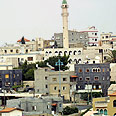
Report: Arab communities overcrowded
Knesset study raises difficult questions about situation of Israel's 1.4 million Arabs. Report says Arab towns overcrowded while unemployment and poverty rates are higher than Jewish population's. MK Swaid: Does state see us as strategic risk?
A report submitted on Tuesday to the Knesset's Internal Affairs and Environment Committee reveals the difficult reality of Israeli-Arab's housing crisis. According to the report, Arab towns are almost twice as crowded as Jewish ones: with an average 1.4 heads per room in a home compared to the Jewish average of 0.86.
The report, compiled by the Knesset Research and Information Center paints a similarly difficult picture of the expected future.
The data analyzed in the report indicates that the Arab population is the fastest growing demographic in Israel while at the same it is also the population which maintains extremely high unemployment rates.
Israel's Arab population consists of 1.4 million people, who constitute roughly 20 percent of the general populace. It is also the fastest growing demographic, with a growth rate of 3.4 percent per year compared to the 2.6 percent maintained by the rest of the population. In numerical terms, 3.4 percent represents the addition of 40,000 people per year.
The majority of Arab citizens live in 122 communities, most of which are situated under municipalities which have been defined as having a low socio-economic status. Unemployment rates among Arabs are also higher than their Jewish counterparts: standing at 10.2 percent of the adult male population compared to 9.3 percent.
Israel sees Arabs as strategic threat
MK Hanna Swaid (Hadash), who initiated the debate on the matter, addressed the findings of the report: "The planning and construction policies have created a situation where thousands of Arab houses are built without permits. On the one hand there is overcrowding, on the other hand there is high unemployment because there are no industrial zones. This causes high unemployment and poverty and creates many problems for the municipalities' revenues from property taxes."Swaid also believes that the government's policy is indicative of its view of the Arab population as a threat: "As long as there is no clear policy striving towards finding solutions for the sector and for expanding the communities, alongside offering stipends – the legitimate question lingering in the air is 'does the state of Israel see us as a strategic threat?'"
MK Effie Eitam (National Union-National Religious Party), who was present for the special meeting, called on the Arab sector to examine the source of the problem.
"The Arab sector must examine if the problem is the policies of the state of Israel since the formation of the country, a continuous policy of discrimination – or is this a problem affecting all of the state's municipalities?
"You cannot hold the stick from both sides – to say that the problem is funding and also speak of discrimination," said Eitam, referring to similar claims made by Jewish municipalities regarding grievous lack of state funding.
"When they examine the problem and find the real problem, we can address it," concluded Eitam.










